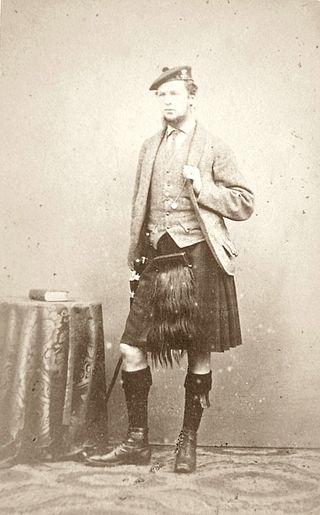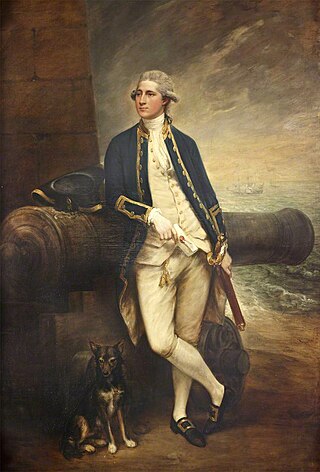Related Research Articles

General Sir Gordon Drummond, GCB was a Canadian-born British Army officer and the first official to command the military and the civil government of Canada. As Lieutenant Governor of Upper Canada, Drummond distinguished himself on the Niagara front in the War of 1812 and later became Governor-General and Administrator of Canada.

Baron Strange is a title which has been created four times in the Peerage of England. Two creations, one in 1295 and another in 1326, had only one holder each, upon whose deaths they became extinct. Two of the creations, that of 1299 and that of 1628, are extant. The surname Le Strange was Latinized as Extraneus. The arms of Le Strange of Knockin Castle in Shropshire were: Gules, two lions passant argent.
Jean Cherry Drummond of Megginch, 16th Baroness Strange was a cross bench hereditary peer in the House of Lords. She also wrote romantic novels and historical works.

General Alexander Gordon, 2nd Duke of Gordon, styled Earl of Enzie until 1684 and the Marquess of Huntly from 1684 to 1716, was a Scottish Jacobite peer.

John James Hugh Henry Stewart-Murray, 7th Duke of Atholl, KT, styled Marquess of Tullibardine between 1846 and 1864, was a Scottish peer.

John Murray, 4th Duke of Atholl, KT, PC, FRS, styled Marquess of Tullibardine from 1764 to 1774, was a Scottish peer.
John Drummond may refer to:

Captain John Augustus Hervey, Lord Hervey was a British diplomat.
Harry Powlett, 4th Duke of Bolton PC, known until 1754 as Lord Harry Powlett, was a British nobleman and Whig politician. He sat in the House of Commons from 1715 to 1754, when he took his seat in the House of Lords.
John Drummond, 10th of Megginch, 15th Baron Strange, was Chief of the Baronial House and Branch of Drummond of Concraig and Lennoch within the clan Drummond and Baron of Megginch.
Adam Drummond, 11th of Lennoch and 4th of Megginch, was a Scottish merchant, banker and politician who sat in the House of Commons between 1761 and 1786.

John Fane, 9th Earl of Westmorland, known as Lord Burghersh until 1771, was an English peer and Member of Parliament.
Robert Bristow of Micheldever in Hampshire was an English politician.

Sir Henry Harpur, 5th Baronet was an English baronet and politician.
Mungo Haldane was a Scottish politician who sat in the House of Commons intermittently between 1715 and 1727.
John Drummond, of Quarrell, Stirling, was a Scottish banker, merchant and politician who sat in the House of Commons from 1727 to 1742.
Before the Acts of Union 1707, the barons of the shire of Perth elected commissioners to represent them in the unicameral Parliament of Scotland and in the Convention of the Estates. The number of commissioners was increased from two to four in 1690.

Adam Drummond of Binend (1679-1758) was a Scottish surgeon-apothecary who was appointed, jointly, as the first Professor of Anatomy at the University of Edinburgh.
Colin Drummond was a Scottish merchant and politician who lived in Quebec, Canada.
John Drummond, 12th of Lennoch, 5th of Megginch, was a Scottish politician who served as MP for Shaftesbury.
References
- ↑ Leigh Rayment's Historical List of MPs – Constituencies beginning with "P" (part 1)
- 1 2 3 4 Sedgwick, Romney R. (1970). R. Sedgwick (ed.). "Drummond, John (d. 1752), of Megginch, Perth". The History of Parliament: the House of Commons 1715-1754. Boydell and Brewer. Retrieved 1 July 2014.
- ↑ Sedgwick, Romney R. (1970). R. Sedgwick (ed.). "Perthshire". The History of Parliament: the House of Commons 1715-1754. Boydell and Brewer. Retrieved 1 July 2014.
- 1 2 3 4 5 6 Burke, Sir Bernard (1853). Index to Burke's dictionary of the landed gentry of Great Britain & Ireland. Colburn and Company. p. 109. Retrieved 1 July 2014.
- ↑ "DRUMMOND, Adam (1713-86), of Lennoch and Megginch, Perth. ". History of Parliament Online . Retrieved 3 December 2017.
- ↑ Henderson, Thomas Finlayson (1894). . In Lee, Sidney (ed.). Dictionary of National Biography . Vol. 39. London: Smith, Elder & Co.